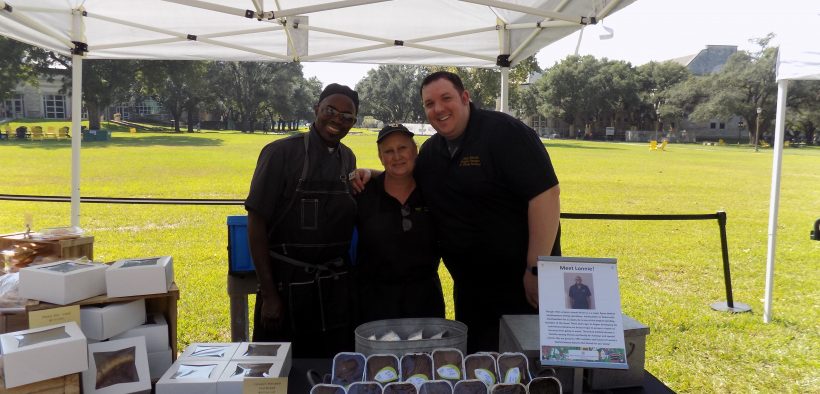Pastries Galore: Farmer’s Market
Share

Sweat trickled down my back in time with my footsteps on the pavement. The day was warm, and chattering voices from the crowd before me filled it with excitement. A song by Ariana Grande pulsed from the speakers set up near the welcomingly shady tents. I couldn’t wait to bite into a crumbly scone.
Wednesday, October 6th was the Southwestern’s second ever farmer’s market: and this time the tables were crowded with pastries. Three tents sat in a row, hovering over the tables filled with brownies, cookies, scones, pies, and more. Samples of banana nut bread and chocolate chip cookies were being handed out like candy, as were sweet secrets to make purchases even tastier (tip: heat up banana bread with some butter and brown sugar on top). It was a delicious spread in the midst of the midday heat.
All treats offered at the market were from local vendors to support the Georgetown community. Each table highlighted a particular business.
One table, featuring white chocolate almond blondies, peach danishes, croissants (with and without chocolate stuffing), cinnamon knots, sourdough bread, blueberry muffins, cranberry scones, and massive chocolate chip cookies, was hosted by Easy Tiger. They are located in Austin and provide the bread for the commons (in addition to making a wide variety of sweet and savory delights).
Another table displayed apple cinnamon focaccia, blueberry lemon focaccia, almond vanilla muffin tops, and apple spice muffin tops – and all of these were vegan! This table was hosted by Bakers of Tomorrow, a 100% plant-based bakery in Wolf Ranch in Georgetown.
The last table exemplified some of the invaluable staff from SU dining, featuring pecan pie, hand pies, zucchini bread, and oatmeal butterscotch cranberry cookies all made in the kitchen. What was extra special was that Lonnie was there selling his mouthwatering banana nut bread.
I chatted with Andy, the general manager of dining services, about the idea for the farmer’s market. His enthusiasm was apparent as he eagerly told me about all of the vendors and emphasized his desire to support local businesses, both for the sake of the Georgetown community and for increased sustainability.
The farmer’s market was advertised with an event held the day before, a curious conversation with local women business owners: namely the ladies at Lark & Owl Booksellers, Liv & Leaf, and The Exchange of Georgetown. Veronica Johnson, Southwestern’s sustainability coordinator, proposed the pairing of the two events to emphasize an important motto for environmental and community sustainability: shop local, eat local. I talked with Ms. Johnson, and she sent me some fun facts about local shopping, which I will include at the end of this article.
The next farmer’s market will be pumpkin-themed, with pumpkin painting, a pumpkin weight guessing challenge with a prize, and, of course, pumpkin-flavored food. This market will also be happening during campus sustainability week, so stay updated for events around that time!
The farmer’s market is a fun and flavorful addition to campus life, one that also supports locality and sustainability. Check out the next market on October 27th!
Why buy local? (source)
Small-scale, locally owned businesses create communities that are more prosperous and connected.
(fun facts sent to me by Veronica Johnson)
- For every $100 spent at an independent, locally owned business, $68 recirculates and remains in our local economy. Only $43 remains in our community when it’s spent at a national chain.
- Local businesses mean a stronger tax base and better use of public services compared to nationally owned stores. This translates into better schools, transportation, and emergency response services for the community.
- Small businesses that select products based not on a national sales plan, but on their own interests and the needs of their local customers, guarantee a much broader range of product choices and prices.
- One-of-a-kind businesses are an integral part of the distinct character of our place. It’s what distinguishes the uniqueness of our community compared to a chain store that looks the same anywhere else.
- Locally owned businesses make more local purchases — requiring less transportation — and set up shop in town or city centers which generally means less sprawl, congestion, habitat loss, and pollution.
- Up to 90 percent of net new jobs in the U.S. are created by locally owned businesses. Small local businesses are the largest employer nationally, and in our community, provide the most jobs to residents.
- Small businesses donate almost 2.5x more per employee to local charitable causes than large, national competitors. Local businesses donate more per sales dollar to local nonprofits, events, and teams compared to national chains.
